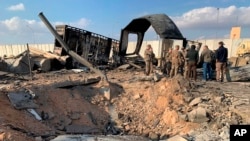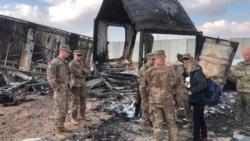The U.S. military says 11 service members have been treated for "concussion symptoms" following Iran's recent attack on two Iraqi bases where U.S. troops were stationed.
Iran's ballistic missile attack was launched in retaliation for the U.S. drone strike that killed Iranian General Qassem Soleimani, the commander of the Islamic Revolutionary Guard Corps' elite Quds Force.
Captain Bill Urban, a spokesman for U.S. Central command, said in a statement Thursday, "While no U.S. service members were killed in the Jan. 8 Iranian attack on Al Asad Air base, several were treated for concussion symptoms from the blast and are still being assessed."
Eight service members are receiving additional screening at Landstuhl Regional Medical Center in Germany, while three have been sent to Camp Arifjan, Kuwait.
"When deemed fit for duty, the service members are expected to return to Iraq," Urban said.
U.S. President Donald Trump had said after Iran's attack in Iraq that no U.S. forces were injured. Multiple officials on Friday said the president would not have known about these injuries in the immediate hours after the incident.
Pentagon press secretary Alyssa Farah told reporters Friday that immediate injury reports to the Pentagon "are for incidents threatening of life, limb or eyesight," so concussion symptoms do not "rise to that threshold."
In the days following the attack, however, the 11 service members who had continued to show concussion-like symptoms were transferred out of Iraq to areas where MRI equipment is available "out of an abundance of caution," added Farah.
Defense Secretary Mark Esper was first notified of the potential brain traumas in a meeting Thursday at the Pentagon, according to chief Pentagon spokesman Jonathan Hoffman.
Downed plane
Hours after Iran’s missile attack on U.S. forces in Iraq, the country's Revolutionary Guard mistakenly shot down a Ukrainian International Airlines plane in Tehran, killing all 176 people on board.
Iran initially said mechanical problems caused the commercial jetliner to go down, before admitting days later that Iranian military personnel mistakenly shot down the plane.
Ukrainian Foreign Minister Vadym Prystaiko told parliament Friday an Iranian official would visit Ukraine next week. Prystaiko said the Iranian government is willing to give Ukraine the plane's voice recorders and flight data after they had been examined by a group of investigators from Iran, Canada and Ukraine.
The foreign minister also said Ukraine wants Iran to release a formal document admitting its guilt.
When speaking with reporters Thursday, Prystaiko said Ukrainian and Iranian officials also "have to have [an] open conversation about what [the Iranian] investigation brings, who's to blame, and then we will want to know what sort of compensation" Iran plans to provide to the victims.
In response to a question about Iran's cooperation, Prystaiko said, "So far we're OK with what they're doing."
Prystaiko's comments came as Iran's supreme leader, Ayatollah Ali Khamenei, led Friday prayers in Tehran for the first time in eight years.
Khamenei said Iran would not succumb to pressure from the "American clowns" who imposed damaging sanctions on Iran and who pretend to support Iran while poised to stick their "poisoned dagger" into its back.
VOA's Ukrainian Service contributed to this report.












